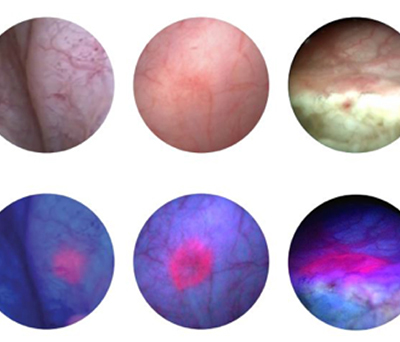
Blood in your urine? Should you be worried? While the first and most common symptom of bladder cancer is often blood in your urine, it doesn’t necessarily mean you have cancer. However, it does warrant evaluation by a urologist.
Other symptoms may include frequent urination, a burning sensation, pelvic pain, and back pain. While, these are more commonly symptoms of less serious conditions such as a urinary tract infection or bladder infection, they should not be ignored and should be evaluated by your doctor.
Washington University urologist Zachary Smith, MD, says “The American Cancer Society estimates about 81,000 cases of bladder cancer occur each year. It is approximately three times more common in men (approximately 62,000 cases in men and 19,000 in women), and about 18,000 people will die from bladder cancer every year (13,000 men and 5,000 women).”
Washington University urologists at Barnes-Jewish Hospital are using a new technology for improved detection of bladder cancer called Blue Light Cystoscopy (BLC ™).
Dr. Smith explains, “Blue Light Cystoscopy enables us to more easily find and diagnose tumors in the bladder. This enhanced imaging helps us locate tumors that may be either too small to visualize with standard white light cystoscopy, or simply normal appearing and harboring occult (hidden) cancer cells. It is available for any patient with bladder cancer or any patient being evaluated for bladder cancer.
A solution (Cysview®) is placed in the bladder using a catheter. This solution penetrates the membrane of the cancer cells, and when viewed with the blue light the cells glow fluorescent pink. These abnormal areas are then able to be biopsied or scraped out of the bladder.
This enhanced diagnostic tool allows us to find all of the tumors at the same time — no matter their size. It saves the patient from undergoing multiple procedures and biopsies for missed tumors.
But most importantly, it results in fewer reoccurrences of bladder cancer because we are able to identify all of the tumors up front that might have otherwise been missed with standard white light cystoscopy. Ultimately, this technology is a huge win for our patients.”
For more information or to make an appointment with Dr. Smith, or any of his colleagues, please call 314-362-8200.
Center for Advanced Medicine
4921 Parkview Place, Suite 11C
St. Louis, MO 63110